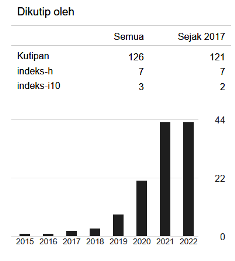RELASI AGAMA DAN PILIHAN NASABAH: GROUNDED THEORY DAN REPOSISI AGAMA PADA PILIHAN NASABAH BANK SYARIAH DI BENGKULU
Abstract
bank in Bengkulu, Province. Concerning in religion preference system and its relation with consumer’s choice
the research is crucially expected to discover the relationship between religion, and the consumer’s choice of
islamic bank in Bengkulu. The reason why the issues must be studied is from theoritical foundation in which
belief system like religion, and rationality is a main factor determining the consumer’s choice towards islamic
bank in varied-cases (Yusof; Bahari; Adanan: 2014). Hence, there are various facts as an important setting
of research—moeslem population in Bengkulu; level of FDR (finance to deposits ration) for many islamic
bank in Bengkulu is 182,3% and also NPF level is 3.30%. Based on this setting, the study intentionaly uses
the grounded theory as approach. It directly legitimates two theories as guidance for the research—rationality
choice theory and shopping preference theory.
The research successfully finds a set of thesis that religion’s rules in consumer’s choice of islamic bank can be
described shortly in two models—religion as Model of ” and “for Reality. These models emerge in consumer’s
behaviour of how they select the islamic bank in Bengkulu. Empirically, it can be attested from the perception,
and definition toward islamic bank as a personal experience. In fact, Islam as a part of religions modified
as justification for their choice. Whilst consumers tend to be a loyal consumer of Islamic bank based on the
belief-- framework produced from their religion, for some users it is eventually because of the economics interest.
For example, islamic bank choice is based on the ultimate-goal to gain exceeded-profit rather merits offered
by the conventinal bank.
Keywords
Full Text:
PDFReferences
Abduh, Muhamad dan Sukmana, Raditya. (2015,
Maret 23). Deposit Behaviour in Indonesia
Islamic Banking: Do Crisis and Fatwa
Matter?. Retrived from http://irep.iium.
edu.my/24033/1/Abduh_and_Sukmana,_
FRPS_2011.pdf.
Awam, Hayat M. & Shahzad Bukhari, Khuram.
(2011). Costumer’s Criteria for Selecting
an Islamic Bank: Evidence from Pakistan.
Journal of Islamic Marketing. Vol. 2, No.1.
Babbie, Earl. (2011). The Basic Social Research.
USA: Wadsworth.
Beal, Timothy K. & Deal, William E. (2004).
Theory for Religious Studies. New York:
Routldge.
Beckford, James A. (2003). Social Theory and
Religion, New York: Cambridge University
Press.
Casey, Conerly & Edgerton, Robert B. (2007). A
Companion to Psychological Anthropology.
Malden: Blackwell Publishing.
Chibnik, Michael. (2011). Anthropology,
Economics and Choice. Austin: University
of Texas Press.
Einstein, Mara. (2008). Marketing Religion in a
Commercial Age. London: Routledge.
Geertz, Clifford. (1973). The Interpretation of Culture.
New York: Basic Books, Inc., Publishers.
Iannaccone, Laurence R. (1998). Introduction
to the Economics of Religion. Journal of
Economic Literature. Vol. 36.
K. Denzin, Norman & S. Lincoln, Yvonna.
(2000). Handbook of Qualitative Research.
London: Sage Publication.
K. Denzin, Norman & S. Lincoln, Yvonna.
(2009). Handbook of Qualitative Research.
(Dariyatno, Terjemahan) Yogyakarta: Pustaka
Pelajar.
Lechner , Frank J. (2006). Rational Choice and
Religious Economies. Dalam James A.
Beckford & N.J. Demerath (ed.), Handbook
of The Sociology of Religion. New York: Sage.
M. Morse, Janice. (2009). Developing Grounded
Theory: The Second Generation. California:
Left Coast Press.
Olson, Carl. (2011). Religious Studies: The Key
Concepts. London: Routledge.
Orlikowski, Wanda J. (1988). IS research
Paradigm: Method versus Substance. Paper
Presented at The Academy of Management
Meeting, Anaheim CA.
Rivai, Harif Amali. Identifikasi Faktor Penentu
Keputusan Konsumen dalam Memilih
Jasa Perbankan: Bank Syariah vs. Bank
Konvensional. Research Report: Centre for
Banking Research (CBR)-Andalas University.
Sukhmono, Brilyan Rahmat. (2011). Pengaruh
Label Syariah pada Lembaga Perbankan
terhadap Jumlah Nasabah BNI Syariah Cabang
Jakarta Selatan. (Skripsi: Program Studi
Muamalat, Fakultas Syariah dan HukumUniversitas
Negeri Syarif Hidayatullah, 2011).
Tibi, Bassam. (2001). Islam between Culture and
Politics. New York: Palgrave McMillan.
Wimberley, Dale W. (1984). Socioeconomic
Deprivation and Religious Selience: A
Cognitive Behavioral Approach. The
Sociological Quarterly 25 Spring.
Zakaria Bahari, Dalfiza Mohd. Yusof, & Adnan,
Ahmad Azrin. (2014). The Relationship
between the Bank Choice Determinant and
The Acceptance of Musharakah Mutanaqisah
Home Financing among Malaysia Muslims.
International Journal of Science Commerce
and Hummanities. Vol. 2, No.
Panca. (2015, Oktober 20). Pastor Kristen
Protestan. Personal Interview.
Prof. Dr. Rokhimin, M.Ag. (2015, Oktober 21).
Personal Interview.
Slamet. (2015, Oktober 12). Pendeta Buddha.
Personal Interview.
Refbacks
- There are currently no refbacks.
Copyright (c) 2019 Turast : Jurnal Penelitian dan Pengabdian

This work is licensed under a Creative Commons Attribution-NonCommercial-ShareAlike 4.0 International License.

This work is licensed under a Creative Commons Attribution-ShareAlike 4.0 International License
Turast: Jurnal Penelitian dan Pengabdian
Lembaga Penelitian dan Pengabdian (LPPM), Gedung Rektorat Lantai I
Kampus III Universitas Islam Negeri Imam Bonjol Padang - All rights reserved
Email: turast@uinib.ac.id



